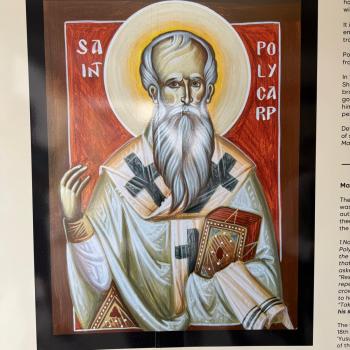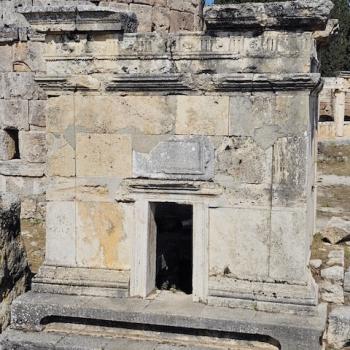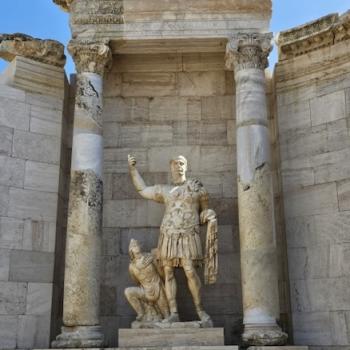This will be our last post on Scot McKnight’s fine book which came out last fall (Brazos Press). It has many merits, not least of which is it is very clearly written, gets right to the point, and has lots of memorable lines like “the Pharisees emphasized the love of Torah, contrasted with Jesus who emphasized the Torah of love”. In this post I want to sum up on a few points to makes clear where I think Scot and I differ.
The first of these points, which you should have gathered from reading the previous posts is that while I agree the kingdom involves all five elements that Scot stressed (see the previous posts), I do not think those things define the word basileia. I think it refers to God’s eschatological saving activity, which results in those five things and more. I think it also, when it is in a sentence discussing the future refers to a place which one enters, inherits, obtains. So the traditional tandem of reign (or divine saving incursion) and realm are a better definition of the word itself. I prefer the translation dominion both in its verbal and noun senses (to have dominion over, to enter the king’s dominion) over the translation kingdom.
Secondly, and related to the first point, Scot makes his case on the basis of the use of the term kingdom during and after the monarchy in reference to Israel or Judah. I think this is a mistake. The kingdom Jesus is referring to involves divine intervention. It is not a continuation of, nor the final perfect iteration of previous kingdoms. Indeed, the proper antecedent is the theocracy which preceded any Jewish kingdoms. We are talking here about the kingdom of God, not the kingdoms of Israel in the Gospels and in the rest of the NT. In part, Scot takes the view he does because he sees the church as ‘Israel expanded’ to use his phrase. This too I would say is a mistake. The church is not the continuation of Israel, nor the perfection of Israel. Israel clearly enough in the NT refers to Jews who are not followers of Jesus. This is especially clear in Roman 9-11 where Paul goes so far as to talk about Israel as those who have been temporarily broken off from the people of God so that the full number of Gentiles can be grafted into the people of God. He then goes on, at the end of Rom. 11 to insist that when Jesus returns, he will turn away the impiety of Jacob, and ‘all Israel will be saved’, by which is meant a large number of Jews who previously did not believe in Jesus. For Paul, the people of God, before the return of Christ, as Jew and Gentile united in Christ which he quite deliberately doesn’t call Israel, he calls it either the body of Christ or the ekklesia. And that brings us to the other important difference between Scot’s view and my own. We disagree about the church.
In my view the local church is not autonomous, but is rather part of the larger church of God referred to by Paul in various places (see Gal. 1). The local church is not independent nor does it have mere self-generating leadership structures. To the contrary there are apostles and their co-workers who are not merely the church planters of various churches, but the leaders over a whole variety of local churches, which also have elders and deacons as the local leaders. In other words, ecclesiology we find in the NT is not harmonious with Baptist views about the local church and its leadership structures. Local churches were answerable to their apostles, such as the letters of Peter and Paul demonstrate.
What Scot is absolutely right about is that all attempts to domesticate or secularize what kingdom means will not do. The Kingdom is neither merely the work of God in the souls of human beings, nor is it merely working for justice and peace in the public sector. The Gospel has both a spiritual and social dimension, as does the Dominion of God. One cannot separate the Kingdom from the King, or good works from the Gospel. I think Scot makes too sharp a distinction between Kingdom mission and good works in the public sphere. I would say any work done whether within the church or outside of it which is done for and unto and in the service of the Lord, is kingdom work. It is also good deeds. I also do not believe that the work of God should be seen as confined to what happens in and by the church, though I quite agree the church is the epicenter, paradigm, primary locale where we can see God in Christ at work. God of course is sovereign and he even works in places where the church does not exist and has not gone. I agree this is exceptional, but it makes the point. The divine saving activity of God which we call kingdom can not be simply equated with what is going on in the church. There is overlap between these two things, but kingdom and church are not simply synonyms, any more than the church is just people. The church is the assembly of God’s people gathered in the presence of the Lord for worship, fellowship and service with the Lord Jesus present in its midst.
Think on these things.













